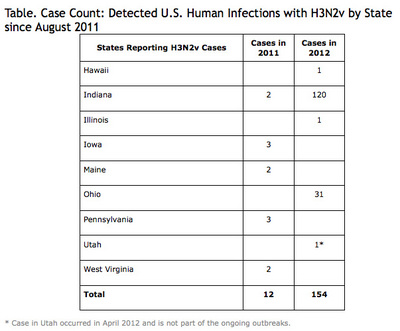Washtenaw County child contracts swine flu virus from pigs
Editor's note: This story was updated at 5:20 p.m. with further information from the CDC.
The first reported case in Michigan of a variant of swine flu known as H3N2 has surfaced in a Washtenaw County child who caught the virus after contact with pigs, health officials said.
The child spent at least the majority of a day in the swine barn at the Ingham County Fair in early August, said Susan Ringler-Cerniglia, spokeswoman for Washtenaw County Public Health.

The first case of a person contracting swine flu variant H3N2 from a pig in Michigan has surfaced in a Washtenaw County child after a day at the Ingham County Fair in early August.
Photo courtest of Farm Sanctuary
“Symptom-wise, it looks like seasonal flu,” Ringler-Cerniglia said.
Symptoms have included fever, cough, pharyngitis, myalgia and headache.
As of Aug. 10, the swine flu H3N2 virus has been detected in 166 humans since it first surfaced in the U.S. in August 2011. The vast majority of those cases have been reported in 2012.
The rise of new cases prompted the Centers for Disease Control and Protection to issue a Health Advisory Aug. 3 and offer two telebriefing sessions this month.
The case count of jumped from 29 the week of July 30 to 158 the week of Aug. 6, thanks to a wave of new cases in Indiana and Ohio, said Dr. Joseph Bresee of the CDC.
No hospitalizations or deaths have been reported with the most recent cases.
Should the virus begin transmitting from person to person, Ringler-Cerniglia said the department would take further measures.
There is no vaccine for the H3N2 variant of the influenza virus. Early steps to make a vaccine against the variant have been taken, but no decision to mass produce such a vaccine has been made.
The seasonal flu vaccine is not designed to protect against H3N2.

Number of human infections of H3N2 from pigs since Aug. 2011 as of Aug. 10.
Courtesy of CDC
The Public Health Department will be updating area practitioners about the presence of the virus, Ringler-Cerniglia said.
Those most at risk for contracting H3N2, as well as any other influenza strain, are those younger than 5 or older than 65, pregnant, or have a weakened immune system.
There have been no additional reports of human cases of H3N2 in Ingham County, said Christine Hendrickson, public information officer for the Ingham County Health Department.
The Ingham County Fair ended Aug. 4. The incubation period for the virus has passed, Hendrickson said, but still urged anyone who may have had contact with swine and feels sick to visit their doctor.
Hendrickson said no dead pigs were reported during the fair.
According to a statement from Dr. Dean Sienko, Interim Chief Medical Executive for the Michigan Department of Community Health, simple steps can be taken to protect your health.
"While this strain of flu is new to Michigan, it's important that people remember the common-sense simple steps that can be take to protect their health as we would with any flu season," Dr. Sienko said.
The MDCH urges those who have contact with pigs to wash their hands frequently, do not eat or drink in pig areas, and if you own pigs, to watch for sickness in animals and call a veterinarian if they appear to be sick.
Amy Biolchini covers Washtenaw County, health and environmental issues for AnnArbor.com. Reach her at (734) 623-2552, amybiolchini@annarbor.com or on Twitter. The Associated Press contributed to this report.


Comments
brian
Thu, Aug 16, 2012 : 6:56 a.m.
Let's just have a big pig roast.
treetowncartel
Thu, Aug 16, 2012 : 4:26 a.m.
Great, now I have to sleep on the couch tonight.
arborani
Thu, Aug 16, 2012 : 1:36 p.m.
And I think that comment just might make it happen.
Linda Peck
Thu, Aug 16, 2012 : 12:01 a.m.
I hope the little girl is better now and has no sequelae from this.
trespass
Wed, Aug 15, 2012 : 10:49 p.m.
Those most at risk for contracting H3N2, as well as any other influenza strain, are those younger than 5 or older than 65, pregnant, or have a weakened immune system. That is not a true statement. Those are the groups most likely to be hospitalized because the may have more severe symptoms but they are not at higher risk of contracting flu than are other exposed people. It is not clear from the article as to why we should be concerned about the H3N2 strain other than it is not covered by the current vaccine. It doesn't seem to be more virulent than other flu strains. On the other hand pigs can contract both human and avian flu so they are thought to be a melting pot where new strains of mixed avian/human virus may be produced but that doesn't seem to be what the article is about.
trespass
Thu, Aug 16, 2012 : 9:13 a.m.
@Jake- I am not sure where you are getting your information. All people who have not been exposed to a flu virus are immunologically naive. How they respond to the infection and how fast they clear the infection may be affected by such things as advanced age or immune deficiency but generally not the initial infection. If you can cite some primary source for your statement I would be glad to read it. I am not saying that the story is not newsworthy but rather I don't understand what I should do with the information, that is what significance should I give it.
Jake C
Thu, Aug 16, 2012 : 12:12 a.m.
No, that's not accurate. The extremely young, elderly, and those with weakened immune systems do indeed have a greater risk of contracting this strain of flu (as well as nearly all contagious illnesses) as well as having more severe symptoms that may require hospitalization. It's newsworthy because it's an unusual transmission vector that people should be aware of, even if it isn't any more harmful than the standard flu variants.
Ann English
Wed, Aug 15, 2012 : 10:45 p.m.
I had expected the 4H Clubs to be responsible for the infection, but apparently they're very good about keeping children free from farm-animal-borne diseases.
bruno_uno
Wed, Aug 15, 2012 : 10:16 p.m.
indiana sure loves bacon
craigjjs
Wed, Aug 15, 2012 : 9:41 p.m.
Great headline. Swine flu was contracted from pigs. Imagine that.
Amy Biolchini
Wed, Aug 15, 2012 : 10:04 p.m.
Variants of the swine flu virus have been known to be transmitted from person to person; most notably, H1N1.